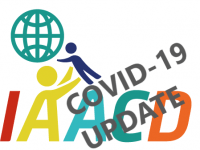AusACPDM COVID-19 Taskforce Listening sessions
In honour of World CP day, the IAACD COVID19 taskforce supported a 24-hour virtual Listening and Sharing session. The AusACPDM assisted in hosting two sessions, featured below.
Understanding the impact of COVID-19 on children with disabilities in the Pacific: Listening session for clinicians & researchers
World Cerebral Palsy Day, 6th October 2020
The panel included speakers involved in both hospital & community-based health service delivery in the Pacific Region.
- Dr Peter Asuo, Paediatrician, Ministry of Health, Kiribati
- Dr Rakei Kaarira, Paediatrician, Ministry of Health, Kirabati
- Ms Sureni Perera, CEO, Frank Hilton Organisation, Suva- Fiji
- Ms Ingrid Sutherland, Clinical Nurse Consultant, Family Well-Being Clinic, Royal Children’s Hospital, Australia
- Dr Georgina Cox, Psychologist, Family Well-Being Clinic, Royal Children’s Hospital, Australia
- Chaired by Dr Kate Milner, Paediatrician, Royal Children’s Hospital Melbourne
Understanding the impact of COVID-19 on children with disabilities in Sri Lanka and Nepal: Listening session for clinicians & researchers
World Cerebral Palsy Day, 6th October 2020
The panel included speakers involved in both hospital & community-based health service delivery in Sri Lanka and Nepal.
- Gopi Kitnasamy, Founder of CPLanka, Sri Lanka
- Romaniya Fernando PT, Sri Lanka
- Bhagya Devagiri SLT, Sri Lanka
- Nistha Shrestha, Nepal
- Chair – Dr Mary-Clare Waugh – Paediatrician, Australia
Supporting families with disabilities impacted by COVID-19: the role of listening sessions
Wednesday 05 August 2020
Our aim is to share our experiences, to learn what has / has not worked, and hear about what learnings we can take into the future. Facilitators from the Taskforce panel included speakers involved in family support organisations and research.
- Prof Alicia Spittle, University of Melbourne, ‘What is a listening session and guidelines on how to run them’
- Amy Hogan, CP Society of New Zealand, ‘What support do families and people with lived experience need’
- Nikki Whyte, Kalparrin, Western Australia, ‘How family support organisations can help’
- Dr Catherine Mak, Psychologist, The University of Queensland, ‘Supporting parents through challenging emotions and personal self-care’
Understanding the impact of COVID-19 on service delivery – Listening session for clinicians & researchers
Wednesday 3 June 2020


Launching the IAACD COVID-19/AusACPDM COVID-19 Task Force, this webinar event provide an opportunity for clinicians and researchers in our community, across Australasia, to explore how best we can help children, families, colleagues and services during the COVID-19 pandemic now and into the future.
Our aim is to share our experiences, to learn what has worked, what has not worked and what learnings we can take into the future. This listening session was facilitated by a panel of speakers representing the research community, and service delivery within the community and hospitals.
Speakers:
- A/ Professor Bernadette Gillick, IAACD COVID-19 Taskforce
- Professor Alicia Spittle, AusACPDM COVID-19 Taskforce
- Dr Mary-Clare Waugh, AusACPDM COVID-19 Taskforce
- Gaela Kilgour, AusACPDM COVID-19 Taskforce
What is a “listening and sharing” session?
“Listening and sharing sessions” are a way to promote open and honest communication across a group of people and provide useful information for taking action. The main emphasis of a listening and sharing session is to share experiences, and to do this we need to listen to a range of perspectives. Listening and sharing sessions are not webinars (which are usually educational like a lecture).
The guide on organising and conducting “Listen and Sharing Sessions” has been created by the Global COVID-19 Childhood Disability “Listening and Sharing committee”. We are a collaborative initiative of the International Alliance of Academies of Childhood Disability (IAACD), hoping to assist both professionals and consumers in hosting their own listening and sharing sessions.
We welcome input from families, children, clinicians and researchers. Please feel free to email any suggestions to add to this tip sheet to aspittle@unimelb.edu.au

